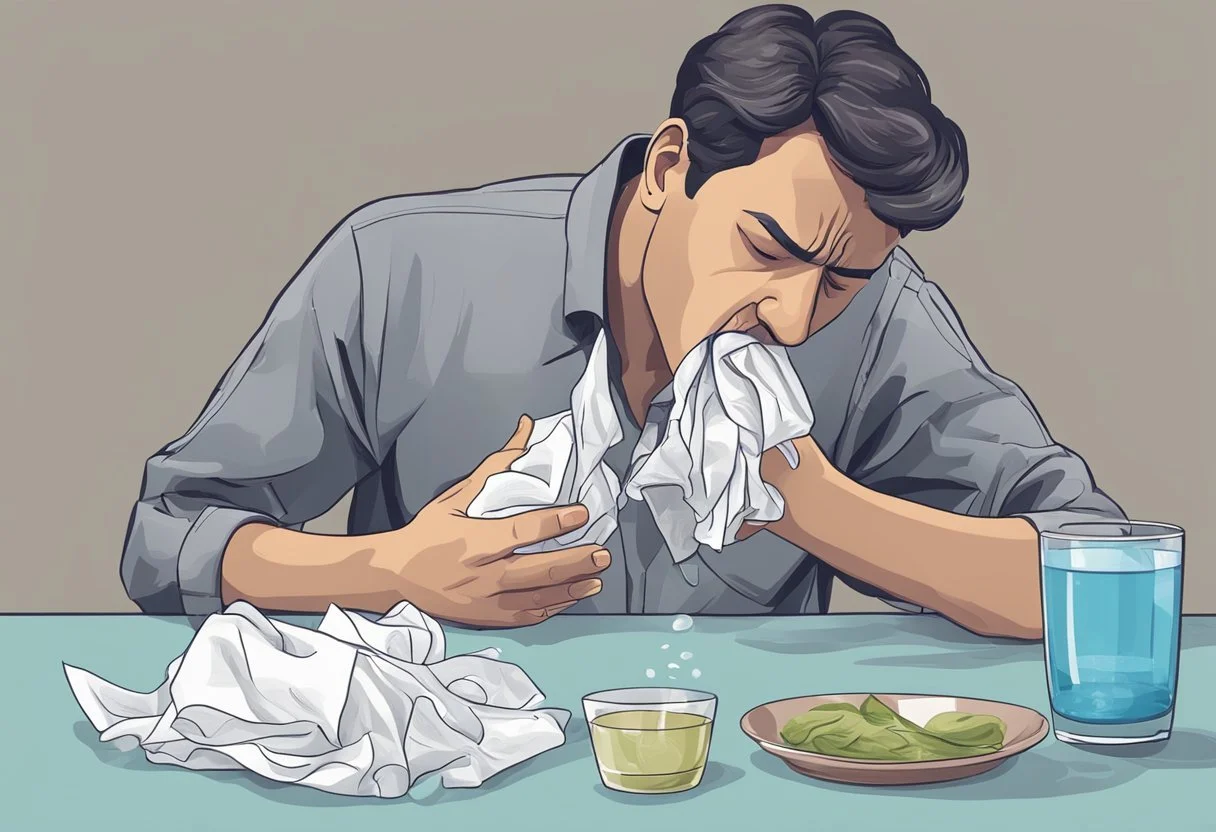Cough
Symptoms, Causes, and Home Remedies
Discover > Health Conditions > Cough: Symptoms, Causes, Home Remedies
Coughing is a common reflex action that helps to clear the throat and airways from irritants, mucus, or foreign particles. Though often a normal physiologic reaction, persistent coughs may indicate an underlying health issue. It is essential to understand the various symptoms and causes of coughs to ensure proper treatment and care.
There is a wide range of causes behind a cough, which may include infections, allergies, respiratory conditions, or environmental factors. In addition to identifying the cause, it is crucial to recognize the symptoms of different types of coughs such as dry, productive, or chronic, as this information can help guide appropriate care and treatment.
Home remedies can be an effective way to address mild to moderate coughs without resorting to over-the-counter medications. Incorporating natural strategies such as hydration, humidifying the air, or using honey, may help soothe a cough and provide relief. By being knowledgeable about the symptoms, causes, and potential treatment options, individuals can make informed decisions about their respiratory health.
Understanding Cough
What is a Cough?
A cough is a common reflex action that helps clear the throat and airways of irritants, mucus, and foreign particles. Coughing can be a symptom of various respiratory conditions, including allergies, infections, and chronic lung diseases. It is important to distinguish between different types of coughs to determine their underlying cause and apply appropriate treatments.
Symptoms of Coughing
The primary symptom of coughing is the sudden expulsion of air through the mouth. Additionally, coughing can be accompanied by other symptoms, such as:
Itchy or sore throat
Shortness of breath
Chest pain or discomfort
Increased production of mucus
Different Types of Cough
There are several types of coughs, including:
Dry cough: A non-productive cough without mucus, often caused by irritation or inflammation in the throat.
Wet cough: A productive cough with mucus or phlegm, usually a result of infection or a buildup of excess mucus in the airways.
Persistent cough: A cough lasting more than 8 weeks, often indicating a chronic condition such as asthma or gastroesophageal reflux disease (GERD).
Chronic cough: A long-lasting cough that is often associated with underlying medical conditions, including COPD, chronic bronchitis, or lung cancer.
Acute cough: A cough lasting less than 3 weeks, typically resulting from a viral infection like the common cold or flu.
How Cough Functions in the Body
Coughing serves several vital functions in the body, including:
Clearing airways: Coughing helps remove irritants, mucus, or trapped particles from the respiratory tract, allowing for easier breathing.
Protecting the lungs: By expelling harmful substances, coughing prevents infections or other respiratory complications.
Signaling a health issue: A persistent or chronic cough might suggest an underlying health condition that requires medical attention.
In summary, a cough is a reflex action essential for maintaining respiratory health. Identifying the type and cause of a cough can help individuals seek appropriate treatments and ensure the optimal functioning of their respiratory system.
Causes of Cough
Illness and Infections
Coughing is often the result of various illnesses and infections, ranging from mild to severe. Common colds and influenza (flu) are caused by viruses and can lead to coughing as the body attempts to clear the respiratory tract of mucus and congestion. In more serious cases, infections such as bronchitis, pneumonia, and whooping cough (pertussis) can also cause coughing. Recent global health crises such as COVID-19 have further highlighted the importance of understanding the causes of cough in relation to infectious diseases.
Allergies
Allergies are a common cause of coughing, as the body's immune system reacts to the presence of allergens. Some frequent allergens include:
Pollen
Dust mites
Animal dander
Mold spores
When an individual encounters these allergens, their immune system may overreact, leading to symptoms such as sneezing, itching, and coughing. In some cases, allergies may also contribute to asthma or make existing asthma symptoms worse.
Acid Reflux and GERD
Gastroesophageal reflux disease (GERD) is a chronic digestive condition in which stomach acid flows back into the esophagus. This can cause irritation, inflammation, and coughing as the body tries to clear the acidic contents. GERD-related coughing is more likely to occur at night or after meals, and is often accompanied by other symptoms such as heartburn, regurgitation, and difficulty swallowing.
Other Causes
There are several other factors that can contribute to coughing:
Chronic bronchitis: A long-term inflammatory condition of the bronchial tubes, resulting in coughing and excessive mucus production.
Postnasal drip: Mucus from the nasal passages drips down the back of the throat, causing irritation and coughing.
Smoking: Cigarette smoke causes irritation and damages the respiratory system, leading to coughing. Exposure to secondhand smoke can also result in coughing.
Lung cancer: A persistent cough can be an early symptom of lung cancer, though it is important to note that the majority of coughs are not due to cancer.
While the causes of coughing are diverse, understanding the various sources can help individuals take steps to prevent or manage this common symptom.
Cough in Different Age Groups
Cough in Children
Cough is a common ailment in children, with various potential causes. Viral infections like the common cold are the most frequent reason for coughing in children. Asthma is another common cause, especially if the cough occurs more frequently at night or during physical activity.
For babies, a unique cause of cough is infant reflux. Additionally, croup, characterized by a barking cough, is prevalent among younger children between the ages of 6 months and 3 years. It is essential to pay attention to any accompanying symptoms, such as fever, difficulty breathing, or persistent cough lasting more than 10 days, as these could indicate a more severe issue.
Some home remedies for cough in children include:
Encourage them to drink plenty of fluids to stay hydrated.
Use a cool mist humidifier in their room to add moisture to the air.
Provide warm liquids like soup or tea to soothe the throat.
Practice good hygiene, such as regular handwashing, to prevent the spread of viruses and bacteria.
Cough in Adults
Coughs in adults can also be attributed to several causes, some of which overlap with those in children. Most commonly, coughs are due to viral or bacterial infections like the flu or bronchitis. Smoking is another significant factor contributing to chronic coughs in adults.
Adults with pre-existing conditions like asthma, COPD, or GERD might experience coughs associated with these issues. Moreover, certain medications can cause coughing as a side effect, particularly ACE inhibitors used to treat high blood pressure.
Some home remedies for adults experiencing a cough include:
Stay hydrated by drinking plenty of water, tea, or juice.
Use a humidifier to help with dry air and congestion.
High-quality honey can help soothe the throat and suppress coughing.
Avoid smoking or exposure to secondhand smoke.
Remember, it is crucial to consult a healthcare professional if a cough becomes severe, persistent, or is accompanied by additional symptoms such as shortness of breath or chest pain.
When to Consult a Doctor
Warning Signs
It is essential to consult a doctor if you experience any of the following warning signs alongside your cough:
Coughing up blood: This can be a sign of a severe underlying condition and requires immediate medical attention.
Chest pain: Persistent or severe chest pain may indicate a more serious issue, such as pneumonia or a heart problem.
Shortness of breath: Difficulty breathing, especially when it worsens during coughing episodes, must be addressed promptly.
High fever: A fever above 101°F (38°C) accompanied by a cough may signal a more severe infection.
Nausea and headache: These symptoms, in addition to a cough, might indicate a more complex illness that requires professional care.
Keep in mind that these warning signs can be indicators of a more serious condition, and it's crucial to seek medical attention when they arise.
Diagnosis
When visiting a doctor, they will evaluate your symptoms and may perform various tests to determine the cause of the cough. Some common diagnostic methods include:
Physical examination: The doctor will listen to your chest and lungs using a stethoscope.
Medical history: They will ask about your symptoms, their duration, and any potential exposure to allergens or infected individuals.
Imaging tests: X-rays or CT scans can provide a clear picture of your chest and lungs, helping identify potential causes.
Lung function tests: These tests measure breathing capacity and can help detect asthma or other lung issues.
Lab tests: A blood test or sputum sample may be collected to detect signs of infection or other underlying conditions.
It's essential to consult a doctor promptly when experiencing any of the previously mentioned warning signs. Early detection and treatment can significantly improve your prognosis and overall health.
Over-the-Counter and Prescription Treatments
Medications
Various over-the-counter (OTC) and prescription medications are available to help alleviate the symptoms of a cough and address its underlying causes. It is essential to choose the appropriate treatment based on the type of cough (productive or non-productive) and its cause (infection, irritation, or allergy). Some common OTC medications include:
Decongestants: These medicines relieve nasal congestion and sinus pressure, which can help reduce coughing. Examples are pseudoephedrine and phenylephrine.
Antihistamines: These medications help to alleviate allergy-related coughs by blocking the action of histamine, a chemical released during an allergic reaction. Examples are loratadine, cetirizine, and fexofenadine.
Expectorants: These medications work by thinning mucus, making it easier to cough up and clear from the airways. Guaifenesin is a commonly used expectorant.
Cough Suppressants
For a dry, non-productive cough, cough suppressants may be recommended to provide relief from persistent coughing. OTC cough suppressants typically contain dextromethorphan (DM), which helps to suppress the cough reflex. However, it is essential not to use cough suppressants for a productive cough, as this can lead to mucus buildup in the lungs. Examples of OTC cough suppressants include:
Robitussin-DM
Delsym
Vicks Formula 44
Prescription cough suppressants may be prescribed by a healthcare provider if OTC options are not providing adequate relief, or if the cough is severe and interfering with daily activities. Codeine and hydrocodone are examples of prescription cough suppressants. However, these medications are opioids and should be used with caution due to their potential for addiction and side effects.
Antibiotic Treatment
If a bacterial infection is causing the cough, a healthcare provider may prescribe antibiotics to treat the infection. It is important to note that antibiotics are not effective in treating viral infections or coughs caused by irritation or allergies. Examples of antibiotics used to treat bacterial infections that cause coughing include:
Amoxicillin
Azithromycin
Doxycycline
It is crucial to take the full course of antibiotics as prescribed, even if the symptoms improve before the medication is finished, to ensure the infection is completely cleared and to prevent antibiotic resistance.
Remember to consult a healthcare provider before starting any treatment for a cough, as they can provide personalized recommendations based on the underlying cause of the symptoms, the severity of the cough, and any potential contraindications or interactions with other medications.
Natural and Home Remedies
When dealing with coughs, it's important to seek a doctor's advice for acute or persistent symptoms. However, there are natural remedies and home treatments that could provide relief alongside prescribed medications. These remedies include herbal teas, steam inhalation, proper hydration, and the use of humidifiers.
Herbal Teas
Herbal teas have been traditionally consumed to alleviate symptoms of cough. Some popular types are:
Ginger tea: Boil ginger root in water, strain, and drink the concoction to help soothe throat irritation.
Mint tea: Mint leaves contain menthol that can help to reduce mucus production and stimulate better airflow.
Marshmallow root tea: Marshmallow root has a thick, slippery texture that may provide soothing relief to the throat.
Other herbal teas that provide relief include thyme and ivy teas. It's important to note that everyone's response to these natural remedies might be different, so trial and error may be required to find the most effective tea for you.
Steam Inhalation
One of the simplest ways to alleviate cough symptoms is to inhale steam. Steam works to moisten and soothe the throat, helping to break down mucus. Methods for steam inhalation include:
Taking a hot shower: Stand in a hot shower and let the steam work its magic.
Using a bowl of hot water: Place a towel over your head and lean over a bowl of hot water, giving you direct access to the steam.
Hydration
Staying adequately hydrated is essential, especially when dealing with a cough. Drinking fluids like warm water and hot drinks helps to thin mucus and make it easier to expel. Consuming a warm drink with honey is also a popular home remedy for cough relief due to its soothing and antibacterial properties.
Another lesser-known practice is gargling with warm salt water. The salt helps soothe the throat and potentially draw out excess mucus, providing temporary relief from coughing symptoms.
Use of Humidifiers
If you live in a dry climate, using a humidifier can help alleviate cough symptoms. By adding moisture to the air, humidifiers help to loosen and break up any congestion in the respiratory tract. This can result in easier breathing and a reduction in coughing episodes.
It's essential to clean and maintain your humidifier to prevent the buildup of bacteria and mold. A properly maintained humidifier can be considered a valuable addition to your home remedies for cough relief.
Preventing Cough
Maintaining a Healthy Immune System
A strong immune system is essential in preventing coughs. Maintaining a healthy lifestyle can help strengthen your immune system, making it less likely for coughs to develop. Here are some tips to follow:
Eat a balanced diet rich in fruits, vegetables, and whole grains
Get regular exercise
Maintain a healthy weight
Get enough sleep
Minimize stress
Stay hydrated by drinking plenty of fluids
Avoiding Irritants
Exposure to common irritants can trigger coughs. To prevent coughs caused by these irritants, it's essential to minimize your exposure to them. Some key steps to reduce the presence of irritants and keep your environment clean are:
No smoking, as it can cause sore throats, congestion, and sinuses
Avoid alcohol, as it can dehydrate the body and cause the mucus to thicken, leading to congestion
Keep your living space dust-free, as dust can irritate your respiratory system
Use air purifiers to reduce pollutants in the air
Avoid fragrances and known allergens in personal care and household products
Additionally, menthol found in cough drops and over-the-counter cold medicines can help provide relief from coughs and ease congestion.
Managing Allergies
Allergies can often lead to coughs, especially when the sinuses are affected. Thus, it's vital to manage your allergies to prevent coughs from developing. Here are some helpful tips:
Know your triggers: Be aware of the allergens that affect you, such as pollen, mold, and dust.
Monitor allergen levels: Keep track of pollen and mold counts in your local area, and avoid outdoor activities when levels are high.
Avoid allergens: Close windows during allergy season and use allergy-proof bedding to protect against indoor allergens.
Take allergy medications: Over-the-counter or prescription medications can help control allergy symptoms, including coughs.
Consider immunotherapy: In some cases, allergy shots or other forms of immunotherapy may be recommended to help desensitize your body to allergens.
By following these guidelines and focusing on maintaining a healthy immune system, avoiding irritants, and managing allergies, you can significantly reduce your chances of developing a persistent cough.
Impact of Cough on Quality of Life
Coughing can significantly affect a person's quality of life, including their sleep pattern and mental health. This section will discuss these effects and provide useful guidance for managing cough symptoms.
Cough and Sleep
A persistent cough can interfere with a person's ability to get a good night's sleep. The constant coughing can cause discomfort and awaken the individual or their bed partner from slumber. Lack of sleep due to coughing can lead to:
Fatigue: Sleep is crucial for maintaining energy levels, and a lack of sleep can lead to exhaustion during the day.
Decreased Immune Function: Insufficient sleep weakens the immune system, making it harder for the body to fight infections and recover from illness.
Decreased Concentration: Sleep deprivation can make it difficult to focus on daily tasks, negatively affecting productivity.
To minimize the impact of coughing on sleep, consider the following suggestions:
Elevate the head with extra pillows to reduce coughing reflex.
Use a humidifier to add moisture to the air, soothing the throat and lessening the cough.
Drink plenty of fluids, especially water, to keep the throat moist and reduce irritation.
Chronic Cough and Mental Health
A chronic cough, lasting more than eight weeks, can also take a toll on mental health. There are several ways that chronic coughing can affect an individual psychologically:
Anxiety and Stress: Continual coughing can create heightened anxiety, as the sufferer may worry about the underlying cause of the cough and the potential impact on their health.
Embarrassment: Excessive coughing can cause feelings of embarrassment, especially in social situations, leading to avoided activities or withdrawal from social engagements.
Depression: The combination of disrupted sleep, anxiety, stress, and the physical discomfort of coughing can contribute to depressive symptoms.
It is important for individuals experiencing a chronic cough to seek medical advice and not underestimate the potential impact on their mental health.
#chronic obstructive pulmonary disease #occasional cough #upper airway cough syndrome #upper respiratory tract infection #respiratory tract infections #subacute cough #severe cough #hay fever






